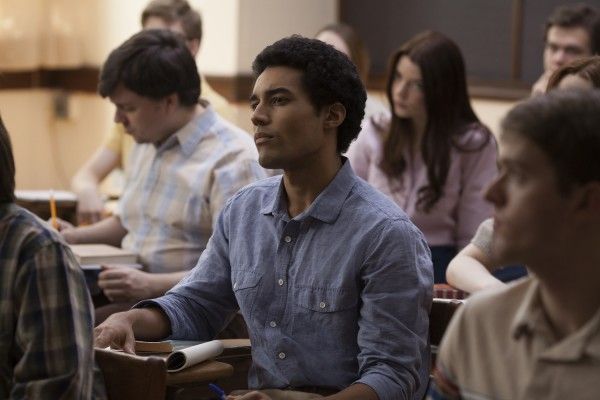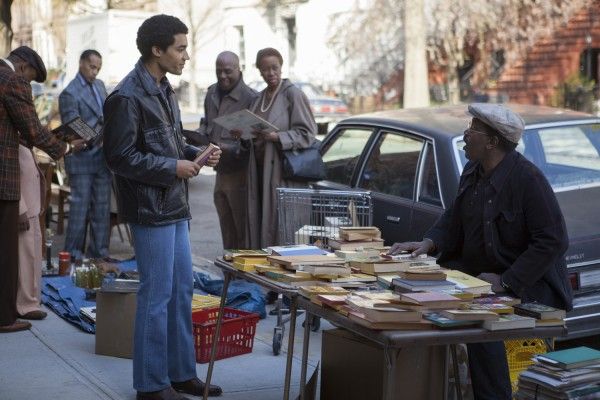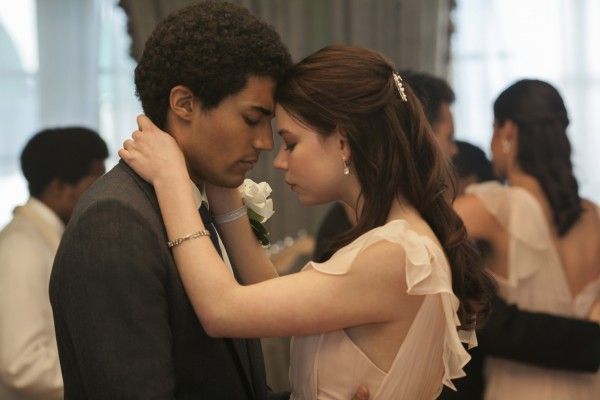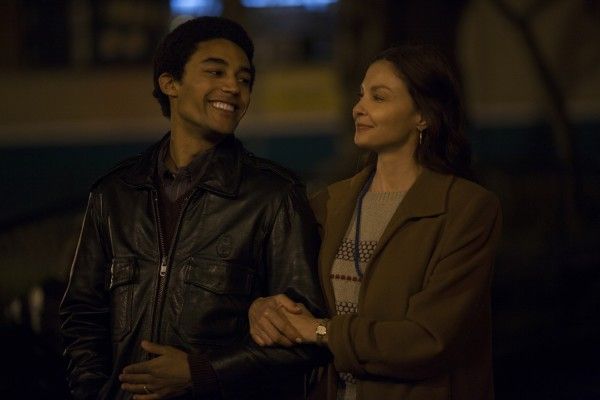With Barack Obama's presidency beginning to make its final bows in a country that's arguably more divided than ever, it's become easy to pick up on early whiffs of nostalgia or wistfulness regarding his near-finished presence in the White House (perhaps no matter your political leanings). And while the year already saw the arrival of a Before Sunrise-esque take on the President's early blooming relationship with Michelle in Southside with You, the more complex (and, in my opinion) far superior Barack Obama film is one that has appeared with much less fanfare. The third feature from director Vikram Gandhi is Barry, a biopic only in name that tracks a young Obama during his time at Columbia as he begins to traverse the complicated tracings of race relations, fitting in, and finding love. But Obama here isn't characterized by his current public profile. Instead, Barry could be about any young black man trying to find his way in life, with the film bearing very little reference to politics.
Previously, Ghandi made Kumare, a pseudo-documentary that saw him transform himself into an enigmatic guru who managed to establish a real cult of followers in the process. After its early and enthusiastic premiere at TIFF, Barry will make its home on Netflix. We had a chance to sit down with the filmmaker before the film's release about his choice of subject, the film's uncanny timeliness, and the astonishing performance he coaxed from a virtual unknown.
COLLIDER: So you did the TIFF thing which was great, and Netflix scooped you up. Could you talk about that process a little bit? Had you anticipated such a timely release date?
GANDHI: I mean we haven’t released yet. So how’s it been? It’s been a couple meetings and conference calls. My plan when making this film was that I wanted it to come out at the period of time between when Barack Obama left office and before the next president took over. When we started the film I approached my producers and I said here’s what I planned. It was like last October I showed them the script. The first time I really showed anyone the script was last October. They wanted to do it and it was a very rigorous schedule, we shot the movie in nine months, made from start to finish. Then a few days after we finished it, it premiered at TIFF. So to me the timeline was very important and Netflix was really the place that I knew we could get it out to the world at that time. A lot of filmmakers have to wait a year for a film to come out and while that’s a great process also to do something traditional, to me it was really important that this came out at this time. You know not just to myself as an artist to keep moving on and making more things but also because it just seemed like the most relevant time for it to come out.
It is tinged with we’re all feeling that nostalgia that maybe we didn’t anticipate was going to happen but already we’re very sad that he’s on his way out. So was that something that you thought of from the beginning?
GANDHI: I think to be honest it was motivation to make something happen. Outside of this I have a pretty great gig working at VICE so the motivation to making your next film is a little….I already have something great going on. To me it was just a way of making sure we got this done. This person is going to leave office and so I better get my shit together and make it happen. Beyond that, there’s nothing better for filmmakers than to have the world see it. We’re not in it for becoming as maybe popular culture imagines you’re in entertainment to become rich and famous, you want the want the world to see it. My last film got out to the world in the most major way through Netflix, millions of people saw it all over the world and it had a slow burn. This time I was really excited to not have a slow burn and just get it out there and have the world see it. That’s the most important thing to me as a filmmaker is that the most people can see the film, there couldn’t be a better way to do that then to go through Netflix.
You mentioned your first film, there is sort of this shared thesis of an underlying humanity or relatable qualities in leaders. So what was it specifically about Obama that he was your in? Because it’s a biopic only by its own definition, it could be technically about anyone.
GANDHI: Well I mean with political leaders there’s a level of projection that everybody has that you have no access to in a real life way. You can only observe them on the television or on the internet. So I think with Barack Obama, he as a politician in his campaign embodied so much of what I think makes people excited about politics and being part of something social activism. So I think that everybody wanted to sort of say they’re a part of his movement. Not only is he the first African American president but he’s the first mixed race president. I think if you look around the world he’s probably considered the first brown president. He sort of had the ethos of what a lot of people in the country were looking for in a leader so the in as a far as a….I’m sorry can you rephrase this question again?
I just was struck by how unique this movie is because this could be about so many people with this identity, so what it is about Obama specifically?
GANDHI: The inspiration to do it just simply came from reading a chapter from Dreams From My Father when I read the section about Columbia University. All of a sudden his entire college life started playing out in my head. The reason that is, is because when I went to Columbia I lived in the building next door to the place where he had lived. So I knew exactly the block he lived in, I knew the kinds of people that lived on that block, the experiences you had when you walked to campus in the morning, where you might stop and get coffee, the classes he took because of the way the curriculum at Columbia worked, the attitudes of kids, all of the color of it and all the details and nuance of it were clear to me. It was really just trying to look into what his experience was and the thing that struck me the most not only about that period of time but also his writings as a young man is they’re incredibly familiar. They talk about alienation, about not knowing where he belongs, about the labels one puts on themselves to figure out how they fit into society and I think anybody who has ever felt alienated or unclear of where they belonged can relate to his story. So when I read it I saw a lot of myself as a 20 year old and I saw a lot of the experiences of my friends. So when I read about the experience I read books about being mixed race, short stories about it. I realized that his experience is so akin to what is probably the future of the entire earth, which is being a global citizen. Being somebody who does not come from one exact “nationality.” Therefore I thought this is a film for anybody who’s ever felt they didn’t fit in somewhere. It’s funny and ironic that that story comes from the most popular or famous human being on Earth right now. The whole idea is to humanize somebody who we all deify or humanize somebody who celebrate as a celebrity we think isn’t like a human but here’s just a regular guy.
Correct me if I’m wrong but there’s a moment when we’re hearing the letter and it’s signed "Barack", and that’s the first time we hear a name that isn’t Barry. At what point in the script did you sort of decide to do that?
GANDHI: Yeah, I mean the whole point is I didn’t really care about Barack Obama, I cared about Barry. I mean I don’t know what it’s like to be President and I don’t know all the steps that he took and how he found his way to become President but what I do know is what he was when he was a guy named Barry at least emotionally, so that’s what I was interested in. I wasn’t interested in saying well this experience triggered this and here’s the causality of how he became president. What I was interested in was how was a guy like him, a guy like Barry, going through in 1981 in New York. What was a guy named Barry going through as a 20 years old mixed race kid in New York in 1981. So therefore I didn’t want it to say Barack. I don’t know if once you hear the name Barack it also takes you out of it. I just wanted you to feel like you were watching any guy’s story, and perhaps maybe forget that you were watching his story and maybe relate to Barry more than Barack. As you know, you hear his name but it’s in voice over so I just wanted us to have the option if we even needed it. I do think that the idea that this was a period of time where Barry decided to own who he was and find his identity and part of that was how do you name yourself, when did he become Barack. It’s not like there’s an exact moment where he decided that he was going to be Barack as I’ve read there’s different moments you can hear. But as someone who was called Vik just for ease and simplicity as a teenager you know at some point as an adult you decide what you are and it sounded that around this time he was becoming Barack.
So clearly there’s a lot of research that went into this there’s small little details that are personal details about him. How deep did you get into the research and how did you stop yourself from putting too much?
GANDHI: I spend a lot of my time being a journalist and having a team of people who help fact check everything and being extremely obsessed with making sure that everything I say and represent is factual, but this is a piece of art and the point is to find the humanity in the character. So therefore there was a lot of research but it wasn’t important who...when it came to secondary characters we took some liberties. There’s also things that happen in his life that are not documented in Columbia but he alludes to in friends and experiences he had in different parts of his life. The most important thing to me was to represent what was going on emotionally with Barry and so it wasn’t about making a historical document. I think there are people even in early screenings who watched it and told me, "wow it’s really exciting to see these real moment that I read about come to life." But there’s so much that’s based on what was happening as far as the entire landscape of New York the experiences he had, what was going on on those blocks. A lot of it came from my own memory of Columbia and my screenwriter's memory of Columbia at that time, a lot of it came from news reports, things that would’ve been on television, things that he would’ve been dealing with. So we used the source material that was out there in the world and then tried to create a much bigger story out of it, but it’s all really based on things that happened to him emotionally.
I think the most striking thing in the entire film is Devon’s [Terrell] performance. I know that he had been in something with Steve McQueen and it never went, but this is his first official on screen performance. So just talk to me about finding him and working with him because he’s Australian, correct?
GANDHI: Yeah, I mean I take full credit for his great performance, I’m just kidding. Devon [Terrell] was someone that I had read about, there’s a tiny thumbnail of him on the Internet attached to this Steve McQueen project. He’s someone I had read about who could play this kid. We cast a wide net when casting with Doug Aibel, an amazing casting director, we just sought whoever was a possibility for the role. At some point we didn’t know Devon was available so he didn’t audition but as we were getting closer and closer to the date we got word that, “Yeah, he’s available. This thing isn’t happening.” So I got on Skype with him and kind of the second that I talked to him I just realized beyond his audition the sort of passion and drive that he had was something that I could completely get behind. He was completely egoless and humble but also just so devoted to the story of Barack Obama because it resembled his own personal story. Devon is from Australia, he grew up up Perth but he was born in the United States. He should speak for himself but, when he was a kid he moved back to Perth and had a similarly complicated relationship with his African-American father. Also is a mixed race African-American kid in Perth, Australia that is not where you find a large population of African-Americans. So when he was growing up he used basketball as an outlet and it’s something that connected him with his own heritage. I actually learned a lot about the mindset of a twenty year old Barry through a twenty-three year old Devon. I’m pretty sure they were going through really similar things, there’s a lot of nuance that comes from him.
Barry arrives on Netflix December 16.







